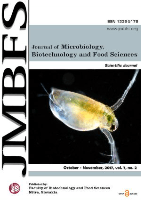
Journal of Microbiology Biotechnology and Food Sciences
Scope & Guideline
Transforming knowledge into practice in the realms of microbiology and food sciences.
Introduction
Aims and Scopes
- Microbial Food Safety and Quality:
Research addressing the role of microorganisms in food safety, contamination, and quality assessment. This includes studies on pathogens, spoilage organisms, and the development of antimicrobial strategies. - Biotechnological Innovations in Food Processing:
Exploration of biotechnological methods to improve food production processes, including fermentation, enzyme applications, and the use of probiotics and prebiotics. - Functional Food Development:
Focus on the development and characterization of functional foods, including the incorporation of bioactive compounds and the evaluation of their health benefits. - Sustainable Food Systems and Waste Management:
Investigations into sustainable practices in food production and waste management, including bioconversion of agricultural waste and the use of natural preservatives. - Molecular and Genetic Studies in Food Microbiology:
Research employing molecular techniques to understand microbial diversity, genetic markers, and the mechanisms of microbial action and resistance in food systems.
Trending and Emerging
- Probiotic and Prebiotic Research:
There is a growing emphasis on the health benefits of probiotics and prebiotics, with research focusing on their effects on gut health and overall well-being. - Nanotechnology in Food Preservation:
Emerging studies on the application of nanotechnology for food preservation and safety, including the development of nanomaterials for antimicrobial packaging. - Plant-Based and Alternative Proteins:
Research into plant-based foods and alternative protein sources is trending, driven by consumer preferences for sustainable and health-oriented diets. - Environmental Impact and Sustainability:
Increased focus on sustainable agricultural practices and the environmental impact of food production, including studies on reducing waste and improving resource efficiency. - Food Microbiome Studies:
Emerging interest in the microbiomes associated with food products and their role in influencing food quality, safety, and health benefits.
Declining or Waning
- Traditional Fermentation Techniques:
There appears to be a waning interest in traditional fermentation methods, as newer biotechnological approaches that emphasize precision and control gain popularity. - Chemical Preservatives and Additives:
Research focused on chemical preservatives and additives in food products is becoming less frequent, possibly due to increasing consumer demand for natural and clean-label products. - General Microbial Ecology Studies:
General studies on microbial ecology in food systems are declining in favor of more targeted research that combines microbial ecology with specific applications in food safety and preservation.
Similar Journals

JOURNAL OF MICROBIOLOGY AND BIOTECHNOLOGY
Leading the Charge in Microbial DiscoveriesJOURNAL OF MICROBIOLOGY AND BIOTECHNOLOGY, published by the Korean Society for Microbiology and Biotechnology, is a premier academic journal based in South Korea that has been at the forefront of advancing knowledge in the fields of microbiology, biotechnology, and their applied sciences since its inception in 1991. This journal holds a commendable Q2 quartile ranking in key categories, including Applied Microbiology and Biotechnology, showcasing its significant impact within the academic community. With an emphasis on high-quality, peer-reviewed research, the journal aims to disseminate innovative findings that foster deeper understanding and advancements in microbial and biotechnological sciences. Researchers, professionals, and students utilize this journal to stay informed about contemporary developments and to inspire future investigations. Although it is not an open-access journal, its content is accessible through various academic libraries and databases, providing a vital resource for those engaged in cutting-edge research.
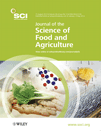
JOURNAL OF THE SCIENCE OF FOOD AND AGRICULTURE
Uncovering breakthroughs in food science and sustainability.Welcome to the Journal of the Science of Food and Agriculture, a leading academic publication in the realms of Agronomy, Food Science, Biotechnology, and Nutrition. Founded in 1950 and published by Wiley, this journal has established itself as a vital resource for researchers and professionals committed to advancing knowledge and innovation in food and agricultural sciences. With a remarkable impact factor reflective of its esteemed status—ranking Q1 in Agronomy and Food Science and Q2 in Biotechnology and Nutrition, this journal stands at the forefront of critical research, featuring rigorous peer-reviewed articles that span a wide array of topics. Access options are available through institutional subscriptions, ensuring that indispensable research reaches both scholars and practitioners alike. As it converges into 2024, the journal continues to address key challenges and opportunities within the field, making it essential reading for anyone interested in sustainable agricultural practices and food security. Engage with cutting-edge research that shapes our understanding of food systems and agricultural advancements.
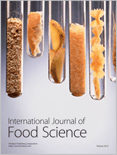
International Journal of Food Science
Exploring Innovative Solutions for Global Food ChallengesThe International Journal of Food Science, published by HINDAWI LTD, stands as a crucial platform for advancing knowledge within the realm of food science. Established in 2013, this Open Access journal based in Egypt has garnered significant recognition, achieving an impressive Q2 classification in the 2023 Food Science category, which reflects its commitment to quality and impactful research. With a Scopus rank of #88 out of 389 in Agricultural and Biological Sciences and placing in the 77th percentile, this journal serves as an essential resource for researchers, professionals, and students dedicated to innovative developments and scientific exploration in food science. The journal not only provides unrestricted access to valuable research but also aims to foster collaboration and dissemination of knowledge on critical issues affecting food safety, nutrition, and technology. For those looking to keep abreast of the latest advancements, the International Journal of Food Science is certainly an indispensable addition to their academic pursuits.

JOURNAL OF MICROBIOLOGY
Pioneering discoveries in applied microbiology and beyond.JOURNAL OF MICROBIOLOGY, published by the Microbiological Society Korea, is a prestigious peer-reviewed journal dedicated to the advancement of knowledge in the fields of microbiology, applied microbiology, and biotechnology. Established in 1996, this journal serves as a vital platform for researchers and professionals from around the globe to disseminate their findings and engage in multidisciplinary discussions pertaining to microbial sciences. With an H-index that reflects its impact, the journal holds a commendable Q2 ranking in key categories including Applied Microbiology and Biotechnology, as well as Medicine (Miscellaneous), which underscores its significance in the academic community. Despite being a subscription-based journal, the JOURNAL OF MICROBIOLOGY aims to contribute to the understanding of microbial processes and their applications, facilitating advancements that are essential in health, industry, and environmental sciences. Researchers, students, and practitioners are encouraged to explore this rich resource for the latest research and trends in microbiology.

COMPREHENSIVE REVIEWS IN FOOD SCIENCE AND FOOD SAFETY
Pioneering Comprehensive Reviews for Food Safety ExcellenceCOMPREHENSIVE REVIEWS IN FOOD SCIENCE AND FOOD SAFETY, published by Wiley, is a premier journal dedicated to advancing the understanding of food science and safety through thorough and critical reviews. With an impressive Q1 ranking in the field of Food Science and a notable Scopus ranking of #4 out of 389 in Agricultural and Biological Sciences, this journal occupies a vital position within the academic community. Its rigorous approach to publishing comprehensive reviews serves as an invaluable resource for researchers, professionals, and students aiming to stay abreast of current trends and advancements in the food sector. Although the journal does not offer open access options, its contributions from 2002 through 2024 reflect a commitment to high-quality scholarship and knowledge dissemination. Researchers looking to elevate their understanding of food safety and related disciplines will find this journal an essential addition to their academic repertoire.
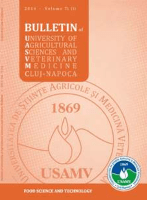
Bulletin of University of Agricultural Sciences and Veterinary Medicine Cluj-Napoca-Food Science and Technology
Transforming Research into Real-World Solutions in Food ScienceBulletin of University of Agricultural Sciences and Veterinary Medicine Cluj-Napoca - Food Science and Technology is a prominent peer-reviewed journal dedicated to advancing the field of food science and technology. Published by the University of Agricultural Sciences and Veterinary Medicine Cluj-Napoca, this open-access journal has been serving the academic community since 2013, promoting the dissemination of high-quality research that addresses pressing issues in food safety, quality, and innovation. With its ISSN 2344-2344 and E-ISSN 2344-5300, the journal aims to bridge the gap between academia and industry by providing a platform for scholars and practitioners to share their findings, insights, and methodologies. Situated in the heart of Romania, the journal reflects the country's rich agricultural heritage and its commitment to enhancing global food systems. By maintaining a rigorous editorial standard, the Bulletin ensures that it remains a vital resource for researchers, industry professionals, and students who are keen to explore the latest developments in food science.

ARCHIVES OF MICROBIOLOGY
Advancing the Frontiers of Microbial ScienceThe Archives of Microbiology, published by Springer, is a reputable journal in the field of microbiology, serving as a vital platform for the dissemination of groundbreaking research and critical reviews since its inception in 1974. With an ISSN of 0302-8933 and an E-ISSN of 1432-072X, this journal operates out of Germany and maintains a global reach, promoting high-quality scholarship across multiple disciplines, including biochemistry, genetics, and molecular biology, as evidenced by its Q2 ranking in Medicine (miscellaneous) and consistent Q3 placements in other categories in 2023. Although the journal does not offer open access options, its rigorous peer-review process ensures that published articles are of the highest standard, making it an essential resource for researchers, professionals, and students keen on advancing their understanding of microbial sciences. As the journal converges toward 2024, it remains committed to fostering innovative microbiological research and facilitating interdisciplinary dialogue within the scientific community.

eFood
Exploring the future of food innovation and safety.eFood is a pioneering journal in the field of food science, published by the esteemed WILEY. With its impactful emergence, the journal has rapidly established itself within the academic community, evidenced by its impressive Q1 category ranking in Food Science as of 2023, and a commendable position at Rank #95 out of 389 in the Scopus database. Covering a wide spectrum of topics related to food innovation, technology, safety, and nutrition, eFood serves as an indispensable platform for researchers, industry professionals, and students who are at the forefront of advancing our understanding of food systems. The journal notably operates with an open-access model, promoting wide dissemination of knowledge while enhancing the visibility of high-quality research. As we look forward to converging years from 2020 to 2024, eFood is poised to foster rigorous scientific discourse and contribute significantly to the future of food science research.

Journal of Food Science and Technology-Ukraine
Pioneering Research in Food Science and TechnologyJournal of Food Science and Technology-Ukraine, published by the Odesa National University of Technology, stands as a pivotal platform dedicated to the dissemination of high-quality research in the field of food science and technology. With its open access policy established in 2014, the journal fosters global knowledge sharing and accessibility, enabling researchers, professionals, and students to access critical findings and advancements in food technology without barriers. The journal's commitment to publishing innovative studies, reviews, and case analyses reinforces its role in addressing contemporary challenges in food safety, preservation, processing, and nutritional quality. With ISSN 2073-8684 and E-ISSN 2409-7004, it serves as a valuable resource for the academic community, supporting the advancement of food science knowledge and its practical applications.
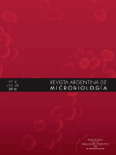
REVISTA ARGENTINA DE MICROBIOLOGIA
Pioneering accessible research in the heart of microbiology.REVISTA ARGENTINA DE MICROBIOLOGIA, published by the ASOCIACION ARGENTINA MICROBIOLOGIA, stands as a prominent open-access journal in the field of microbiology and medicine since its establishment in 1979. With an ISSN of 0325-7541 and an E-ISSN of 1851-7617, this journal has paved the way for disseminating high-quality research while enhancing accessibility for academics and practitioners worldwide. The journal has achieved notable rankings, being classified in Q3 for Medicine (miscellaneous) and Q3 for Medical Microbiology in 2023, reflecting its commitment to advancing knowledge in these critical areas. Despite its relatively modest impact factors, it occupies a vital niche in the academic landscape, fostering collaborations and innovative research among experts. With Open Access available since 2013, REVISTA ARGENTINA DE MICROBIOLOGIA not only facilitates widespread distribution of valuable scientific information but also empowers researchers, professionals, and students to stay abreast of the latest findings and developments in microbiology. For those engaged in the evolving realm of microbiology, this journal serves as an essential resource for sharing insights and advancing the scientific community.